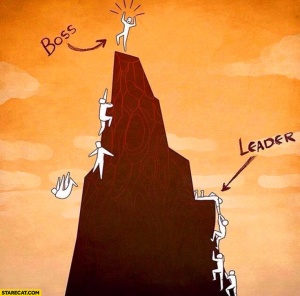This is excerpted from my Leadership Development course, which, as a whole, I found fascinating and useful in many different parts of my life.
When I think of leadership, the image that is in the forefront of my mind is the one where the leader is reaching down to pull others up the mountain. I think, above anything else, our job as leaders is ensure that we have a healthy community. There are many other things that go into it, of course, but you can’t be a leader of none. Leadership is service, especially in the context of an ADF Priest.
 (“Boss Leader”)
(“Boss Leader”)
Some of the qualities and skills that go into being a good leader are a strong focus on introspection and self-reflection, being aware of and knowledgeable about your community and members, and assuming positive intent.
When talking about introspection and self-reflection begin integral to leadership, there are many reasons why. When we work understand ourselves, we are able to not only engage in self-care, but are also better able to understand others. Self-reflection is important when dealing with potential burnout in yourself. You need to know when you’ve been pushing yourself too hard, and allow yourself a time out to kindle your own flame. You must keep your own flame bright, or you cannot show others it’s light.
You need self-reflection as well because you need to be aware that your words and your actions have weight, and you must be careful how you use that weight and influence. If others view you as a leader, then they are more likely to ascribe more weight to your words.
Introspection and self-reflection also allow you to continue to expand your worldview, and reach an understanding with multiple viewpoints. Be engaging in introspection, you can allow your views to continually change as needed to be adaptable to the situations at hand. You are better equipped to remain nonjudgmental in the face of adversity. You are more able to be as Teutates, the Gentle Gardener and Tender of the Tribe, and help new, innovative, and strong ideas to blossom and grow.
As a leader, you must be aware or your staff and their skill sets. This is a two-fold need for leaders. Not only does it allow you to know whom you can lean on for support, especially if you are pushing up against burnout, but it also means that you know the potential of the future. You will know who, and how, to build up and encourage those skilled individuals towards leadership.
Last, but certainly not least, it is important for leaders to assume positive intent, not nefarious motivations, in others. Oftentimes leaders are so passionate about their work that they get caught up in the details of the process, and can sometimes lose sight of the vision, of the bigger picture. It is vitally important for the health of the team and the larger community that the leader assumes we are all working towards the same bright vision, and though we may have different ideas on how to achieve it, each person is honestly doing their best.